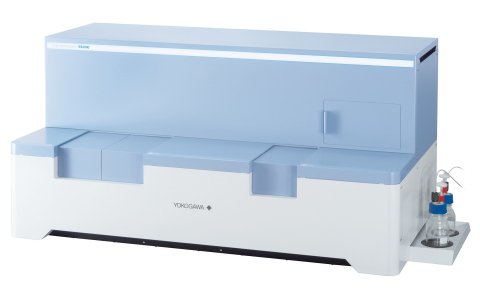Yokogawa Develops Single Cellome System SS2000 for Subcellular Sampling
02 December 2021 | Thursday | News

Yokogawa Electric Corporation (TOKYO:6841) announces that it has developed the Single Cellome™ System SS2000, a single-cell analysis solution that utilizes high-resolution images captured with a confocal microscope to automatically and accurately collect samples of specific cells and intracellular components. The SS2000 will be released in Japan, the US, and China in February 2022, with release in other markets such as Europe to follow at a later date.
Development Background
As the smallest unit of all living organisms, cells can greatly differ from one another; hence, there is a growing focus on single-cell analysis involving the isolation and handling of individual cells, as opposed to studying a population. In recent years, with improved analytical technology, it has become possible to analyze not only single cells but also specific molecules within them. Understanding the characteristics and functions of cells and mechanisms for cell development is a very effective means for clarifying the causes of diseases, preventing them, and verifying the efficacy of new drugs. This is essential for drug discovery research and the development of precision medicine and regenerative medicine.
Conventional techniques for the analysis of intracellular components have typically involved the disruption and collection of heterogeneous cell populations, which does not allow for sampling at the individual cell level, so many components cannot be collected and essential information on cell location and morphology is lost. In addition, as this sampling is done manually, throughput is low, and it is quite difficult for even experienced researchers.
Utilizing Yokogawa’s core imaging technologies that enable the real-time analysis of minute phenomena in live cells, the Single Cellome System SS2000 incorporates new technologies that automatically and accurately control sampling operations in order to support the performance of cutting-edge life science research.
Features
Yokogawa confocal microscopy technology enables the rapid, minimally invasive imaging of living cells. Based on the high-sensitivity analysis of the high-resolution 3D images, the cells are automatically and precisely sampled using precise positioning technology.
1. Optimal selection of cells or regions within cells according to set criteria
The SS2000 analyzes images of a large number of cells within a target range and classifies them by using provided criteria such as cytoplasm area and nucleus size. It then identifies which cells are suitable for analysis and determines their sampling location. Utilizing criteria such as distance from the nucleus, image analysis can even identify optimal regions within individual cells.
2. Reliable sampling of target cells and components within individual cells
The SS2000 directly samples only target cells without detachment, retaining all positional and morphology information in the culture plate. Furthermore, the utilization of high-resolution 3D images and precise positioning technology enables the selective sampling of target organelles and cytoplasm.
3. Samples can be used for a broad range of analyses
The collected cells and intracellular components can be used for a broad range of analyses, including genetic analysis and mass spectrometry. The optimum and efficient collection of target samples improves analytical sensitivity. In addition, single living cells that have been sampled can be grown in secondary cell cultures.
Hiroshi Nakao, a Yokogawa Electric vice president and head of the Life Business Headquarters, comments, "The newly developed Single Cellome System SS2000 is a solution that will play a key role in future cell research. It provides the potential to understand not only the characteristics of single cells, but also the networks and communication between cells, allowing us to ascertain pathological mechanisms. In an era where more and more people are living to the age of 100, Yokogawa will accelerate the development and provision of solutions to protect lives, health, and safety."
Most Read
- How Does GLP-1 Work?
- Innovations In Magnetic Resonance Imaging Introduced By United Imaging
- Management of Relapsed/Refractory Multiple Myeloma
- 2025 Drug Approvals, Decoded: What Every Biopharma Leader Needs to Know
- BioPharma Manufacturing Resilience: Lessons From Capacity Expansion and Supply Chain Resets from 2025
- APAC Biopharma Review 2025: Innovation, Investment, and Influence on the Global Stage
- Top 25 Biotech Innovations Redefining Health And Planet In 2025
- The New AI Gold Rush: Western Pharma’s Billion-Dollar Bet on Chinese Biotech
- Single-Use Systems Are Rewiring Biopharma Manufacturing
- The State of Biotech and Life Science Jobs in Asia Pacific – 2025
- Asia-Pacific Leads the Charge: Latest Global BioSupplier Technologies of 2025
- Invisible Threats, Visible Risks: How the Nitrosamine Crisis Reshaped Asia’s Pharmaceutical Quality Landscape
Bio Jobs
- Sanofi Turns The Page As Belén Garijo Steps In And Paul Hudson Steps Out
- Global Survey Reveals Nearly 40% of Employees Facing Fertility Challenges Consider Leaving Their Jobs
- BioMed X and AbbVie Begin Global Search for Bold Neuroscience Talent To Decode the Biology of Anhedonia
- Thermo Fisher Expands Bengaluru R&D Centre to Advance Antibody Innovation and Strengthen India’s Life Sciences Ecosystem
- Accord Plasma (Intas Group) Acquires Prothya Biosolutions to Expand Global Plasma Capabilities
- ACG Announces $200 Million Investment to Establish First U.S. Capsule Manufacturing Facility in Atlanta
- AstraZeneca Invests $4.5 Billion to Build Advanced Manufacturing Facility in Virginia, Expanding U.S. Medicine Production
News











